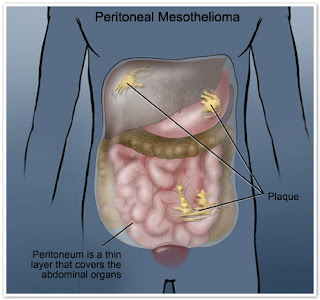Peritoneal Mesothelioma Cancer
Monday, February 20, 2017
Add Comment
Cancer from the lining from the abdominal cavity is known as peritoneal mesothelioma cancer. It's not as fashionable as pleural form it comprises an believed one fifth to 1 third of diagnosed mesothelioma cancer cases. This report from the Surveillance, Epidemiology and Finish Results (SEER) approximates the amount as 54.7% male and 45.3% female, using the age varying from 65 to 69. The time of latency is shorter for patients uncovered in asbestos, the signs and symptoms appearing after twenty to thirty years from exposure the typical latency period for pleural mesothelioma cancer is thirty to forty years.
Peritoneal Mesothelioma cancer Signs and symptoms
During the time of presentation, signs and symptoms of peritoneal mesothelioma cancer includes abdominal mass, abdominal discomfort, enlarged abdominal girth, fluid within the abdomen (ascites), distention from the abdomen, weight reduction, fever, anemia, fatigue and digestive disturbances. For any couple of several weeks before a confirmed diagnosis, some patients even complain of signs and symptoms which are non-specific. Incidentally, peritoneal mesothelioma cancer can be found in a portion of cases when the patient has other health complaints for example hernia, gall bladder or pelvic mass.
Doctors who've encounters in this subject have noted that typically, patients have these signs and symptoms six several weeks to 2 years before the diagnosis. Men frequently arrived at the physician complaining of the bulge within the groin (hernia) or round the navel (umbilical hernia). For ladies, the very first manifestation of an issue frequently occurs following a pelvic test whenever a tumor mass have been located.
In later stages of peritoneal mesothelioma cancer, one of the signs and symptoms are elevated occurrences of thrombus and obstruction from the bowel. There's an obvious increase around the platelet count for 50% of peritoneal patients but this can be brought on by various disorders, making this really of little assist in diagnosing. Low albumin level and anemia may also be one of the signs and symptoms.
In later stages of peritoneal mesothelioma cancer, one of the signs and symptoms are elevated occurrences of thrombus and obstruction from the bowel. There's an obvious increase around the platelet count for 50% of peritoneal patients but this can be brought on by various disorders, making this really of little assist in diagnosing. Low albumin level and anemia may also be one of the signs and symptoms.
Peritoneal Mesothelioma cancer Diagnosis
Peritoneal mesothelioma cancer has two clinical types which may be differentiated with the aid of CT findings, the "dry" type and also the "wet". It's considered "dry" when you will find multiple small masses a treadmill dominant localized mass and usually little if any ascites. The "wet" type has prevalent small nodules, no dominant mass along with a existence of ascites.
If fluid is located, the entire process of eliminating it's through paracentesis nevertheless the analysis of the fluid has limited diagnostic significance. Normally, a definitive diagnosis might be acquired through tissue biopsy.
If fluid is located, the entire process of eliminating it's through paracentesis nevertheless the analysis of the fluid has limited diagnostic significance. Normally, a definitive diagnosis might be acquired through tissue biopsy.
Staging
As there's presently no staging system for peritoneal mesothelioma cancer, typically the most popular system for general cancer staging (TNM system) can be used. TNM system has got the following criteria: (T) status from the tumor, (N) lymph nodes and (M) metastases. Other general groups can also be useful to be able to determine happens.
- Category 1 - having a localized lesion that may entirely be removed (resected)
- Category 2 - the condition is situated within the abdominal cavity on peritoneal or organ surfaces where there's a possibility of removing just as much tumor as you possibly can (debulking)
- Category 3 - the condition is situated within the abdominal cavity and invades organs for example liver or colon.
- Category 4 - the condition extends outdoors from the abdominal cavity
Peritoneal Mesothelioma cancer Treatment
Previously years, the potency of surgery alone or intraperitoneal chemotherapy in treating peritoneal mesothelioma cancer weren't proven, that's the reason multimodality treatment methods are gaining popularity. Debulking (cytoreductive) surgical treatment is removing any almost all visible tumors and could be coupled with IPHC (Intra-Peritoneal Hyperthermic Chemotherapy), intraperitoneal chemotherapy and radiation.
Removing all tumors isn't necessarily probable the prognosis for survival may then maintain compliance using the completeness of cytoreduction that is established by these criteria :
Removing all tumors isn't necessarily probable the prognosis for survival may then maintain compliance using the completeness of cytoreduction that is established by these criteria :
- (CC-): No peritoneal seeding is located inside the operative areas
- (CC-1): Nodules under 2.5 cm continues after cytoreduction which may be permeated by intra-cavity chemotherapy thus the operation is termed complete.
- (CC-2) Nodules with sizes of two.5 to five cm keep on after cytoreduction
- (CC-3) Nodules which are bigger than 5 cm are located or there's a merging of tumor nodules which are unresectable at any section inside the pelvis or abdomen.
Some patients might have prevalent disease where surgical treatment is not regarded as "potentially curative", palliative treatment may be carried out by debulking. Be aware that specialized treatments must only be administered by seasoned doctors because peritoneal mesothelioma cancer is really a rare malignant disease.
Lately, a medical trial discovered Alimta (pemetrexed) to work as chemotherapy agent on treating peritoneal mesothelioma cancer, either by itself or coupled with cisplatin or any platinum-based drug. This reflects the prior findings regarding pemetrexed medication of pleural mesothelioma cancer.
Lately, a medical trial discovered Alimta (pemetrexed) to work as chemotherapy agent on treating peritoneal mesothelioma cancer, either by itself or coupled with cisplatin or any platinum-based drug. This reflects the prior findings regarding pemetrexed medication of pleural mesothelioma cancer.

0 Response to "Peritoneal Mesothelioma Cancer"
Post a Comment